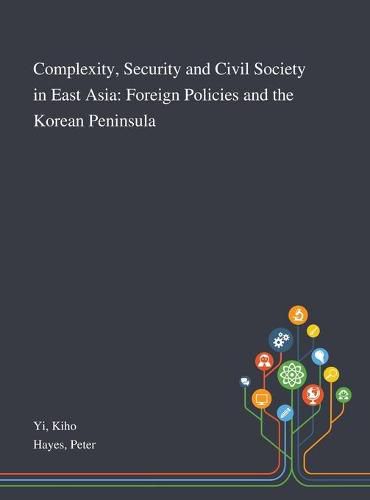Readings Newsletter
Become a Readings Member to make your shopping experience even easier.
Sign in or sign up for free!
You’re not far away from qualifying for FREE standard shipping within Australia
You’ve qualified for FREE standard shipping within Australia
The cart is loading…






This title is printed to order. This book may have been self-published. If so, we cannot guarantee the quality of the content. In the main most books will have gone through the editing process however some may not. We therefore suggest that you be aware of this before ordering this book. If in doubt check either the author or publisher’s details as we are unable to accept any returns unless they are faulty. Please contact us if you have any questions.
Complexity, Security and Civil Society in East Asia offers the latest understanding of complex global problems including nuclear weapons, urban insecurity, energy, and climate change in the region. Detailed case studies in China, North and South Korea, and Japan demonstrate the importance of civil society and ‘civic diplomacy’ in reaching shared solutions to these problems in East Asia and beyond. Each chapter describes regional civil society initiatives that tackle complex challenges to East Asia’s security. In so doing the book presents key pressure points at which civil society can push for constructive changes
especially ones that reduce the North Korean threat to its neighbors. Unusually, this book is both theoretical and practical. Complexity, Security and Civil Society in East Asia identifies strategies that can be led by civil society and negotiated by its diplomats to realize peace, security and sustainability worldwide. It shows that networked civic diplomacy offers solutions to these urgent issues in ways that official ‘complex diplomacy’ cannot. By providing a new theoretical framework based on empirical observation, the book is a must read for diplomats, scholars, students, journalists, activists and individual readers seeking insight into how to solve the crucial issues of our time. (Please note that the grant information as stated in the metadata below applies only to the following chapter: 6. The Implications of Civic Diplomacy for ROK Foreign Policy ). This work was published by Saint Philip Street Press pursuant to a Creative Commons license permitting commercial use. All rights not granted by the work’s license are retained by the author or authors.
$9.00 standard shipping within Australia
FREE standard shipping within Australia for orders over $100.00
Express & International shipping calculated at checkout
This title is printed to order. This book may have been self-published. If so, we cannot guarantee the quality of the content. In the main most books will have gone through the editing process however some may not. We therefore suggest that you be aware of this before ordering this book. If in doubt check either the author or publisher’s details as we are unable to accept any returns unless they are faulty. Please contact us if you have any questions.
Complexity, Security and Civil Society in East Asia offers the latest understanding of complex global problems including nuclear weapons, urban insecurity, energy, and climate change in the region. Detailed case studies in China, North and South Korea, and Japan demonstrate the importance of civil society and ‘civic diplomacy’ in reaching shared solutions to these problems in East Asia and beyond. Each chapter describes regional civil society initiatives that tackle complex challenges to East Asia’s security. In so doing the book presents key pressure points at which civil society can push for constructive changes
especially ones that reduce the North Korean threat to its neighbors. Unusually, this book is both theoretical and practical. Complexity, Security and Civil Society in East Asia identifies strategies that can be led by civil society and negotiated by its diplomats to realize peace, security and sustainability worldwide. It shows that networked civic diplomacy offers solutions to these urgent issues in ways that official ‘complex diplomacy’ cannot. By providing a new theoretical framework based on empirical observation, the book is a must read for diplomats, scholars, students, journalists, activists and individual readers seeking insight into how to solve the crucial issues of our time. (Please note that the grant information as stated in the metadata below applies only to the following chapter: 6. The Implications of Civic Diplomacy for ROK Foreign Policy ). This work was published by Saint Philip Street Press pursuant to a Creative Commons license permitting commercial use. All rights not granted by the work’s license are retained by the author or authors.